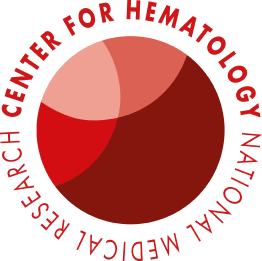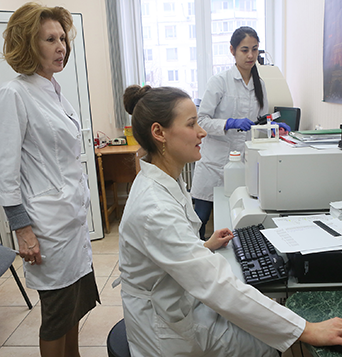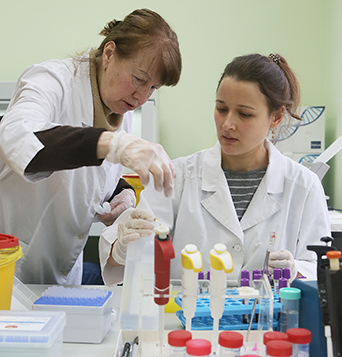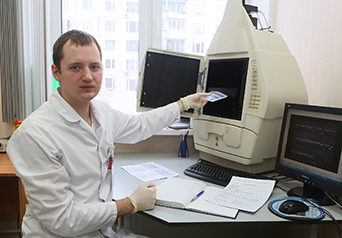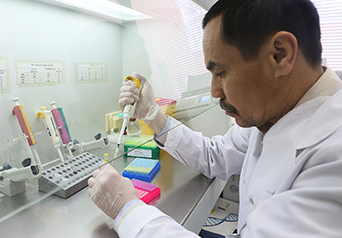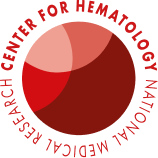
Head of the department- Ekaterina G. Khamaganova, Doctor of Biological Sciences.
The Department of Tissue Typing was established in December 2017 and functions as part of the Division of Transfusiology.
The goals of the department are as follows:
- performing DNA typing of genes of the of major histocompatibility complex (HLA) in patients of the NMRC for Hematology in need of allogeneic hematopoietic stem cell transplantation and their potential donors using the following methods:
— NGS-next generation sequencing
— PCR-SSP (PCR + Sequence Specific Primers)
— PCR-SSO (PCR + Sequence Specific Oligonucleotides) - the creation of a database of HLA-typed unrelated bone marrow donors/hematopoietic stem cells of the NMRC for Hematology (together with the Department of Transfusiology of the NMRC for Hematology)
- the study of anti-HLA alloimmunization in patients with indications for transplantation of allogeneic hematopoietic stem cells
- the study of the genes of killer immunoglobulin-like receptors of natural killer cells
Allogeneic hematopoietic stem cell transplantation (allo-HSCT) is a life-saving method for many patients with diseases of the hematopoietic system. Selection of donors for allo-HSCT is based on the results of HLA genotyping of the patient and potential donors. No more than one quarter of patients requiring allo-HSCT have an HLA-identical related donor. For all other patients, a search for an unrelated HLA-matched donor is required.
The database of voluntary, anonymous, non-reimbursed bone marrow/hematopoietic stem cell donors of the NMRC for includes more than 14,000 HLA-genotyped donors, of which about half are HLA-typed at the level of high and ultra-high resolution by next generation sequencing- NGS for 11 HLA genes: DRB1/DRB3,4,5/DQB1/DQA1/DPB1/DPA1
Department equipment:
- automatic stations for mass and single isolation of nucleic acids QIAsymphony and QIAcube (Qiagen, Germany);
- Illumina MiSeq System (Illumina, USA) for HLA typing of patients and donors using next-generation sequencing NGS;
- a set of equipment for polymerase chain reaction (PCR), including three amplifiers, as well as equipment for conducting visualization and documentation of gel electrophoresis;
- Luminex 200 device for multiplex analysis of HLA genes by PCR-SSO method and detection of anti-HLA antibodies, including donor-specific antibodies.
DEPARTMENT STAFF:
- Head of the department, Doctor of Biological Sciences Ekaterina G. Khamaganova (member of the European Federation for Immunogenetics)
- senior researcher, Candidate of Biological Sciences
- 3 researchers
- 2 doctors of clinical and laboratory diagnostics
- 1 medical technologist

Sitting: biologist, Igor Y. Urybin. Standing: (from left to right): biologist, Alena R. Abdrakhimova; Head of the Laboratory, Doctor of Biological Sciences , Ekaterina G. Khamaganova; medical technologist, Konstantin V. Vasyukov; researcher, Tamara P. Chugreeva; senior researcher, Candidate of Biological Sciences, Elena P. Kuzminova
KEY EMPLOYEES
Elena P. Kuzminova — Senior Researcher, Candidate of Biological Sciences (2013). Elena Kuzminova graduated from the Faculty of Biology of the Chelyabinsk State University and then continued her postgraduate studies at the same university. She has been working at the NMRC for Hematology since 2013. She actively participates in the creation of a database of unrelated bone marrow/hematopoietic stem cell donors of the NMRC for Hematology. Her research interests include the study of immunogenetic profiles of various Russian populations. She is a member of the European Federation for Immunogenetics.
Evgeniy A. Leonov - Doctor of Cinical and Laboratory Diagnostics. Evgeniy Leonov graduated in 2016 from the I.M. Sechenov First Moscow State Medical University with a degree in medical and preventive medicine. In 2018, he completed his residency at the NMRC for Hematology in the specialty "Clinical laboratory diagnostics.” He has been working in the Laboratory of Tissue Typing since 2018. During this time, he has prepared his Candidate’s thesis for defense. He has repeatedly made presentations at international and Russian immunogenetics conferences. Research interests – sequencing of human histocompatibility genes, identification of new HLA-alleles.

